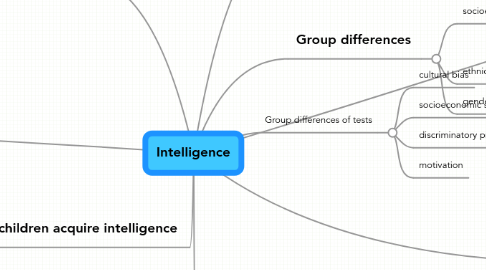
1. definition: a person's ability to think and learn. How one learns from, learns about, understands and interacts with their environment.
2. Componets
2.1. adaptive
2.1.1. the ability to respond to a variety of situations and problems.
2.2. learning ability
2.2.1. the ability to learn new information and behaviors more quickly and easier in certain domains.
2.3. prior knowledge
2.3.1. past experiences that help one to analyze and understand specific situations.
2.4. culture-specific
2.4.1. intelligent behaviors differ in cultures.
2.5. different mental process
2.5.1. the interaction of many processes such as cognitive processes.
3. How children acquire intelligence
3.1. Hereditary influences
3.1.1. speed of processing
3.1.2. influence cognitive development
3.2. Environmental influences
3.2.1. home environment
3.2.1.1. parental behaviors
3.2.2. nutrition
3.2.3. toxic substances
3.2.4. early intervention
3.2.5. educational opportunities
4. Measuring Intelligence
4.1. Wechsler Intellience scale for Children
4.1.1. widely used and designed for children 6-18.
4.2. Stanford_binet Intelligence Scales
4.2.1. second commonly used and designed for children 2 through adulthood.
4.3. Universal Nonverbal Intelligence Test
4.3.1. depends heavily on language and designed for ages 5 through 17.
4.4. specific ability tests
4.5. Dynamic Assessment
4.5.1. assessing child's ability to learn in new situations.
5. Group differences of tests
5.1. cultural bias
5.2. socioeconomic status
5.3. discriminatory practices
5.4. motivation
6. Questions/Critiques
6.1. How much does biological and environmental factors affect one's intelligence?
6.2. How can one's intelligence level be accurately measured without being biased, but yet culturally sensitive?
6.3. Do I.Q tests take into account all levels of intelligence (Gardeners Multiple Intelligences)?
6.4. What characteristics separate gifted individuals from highly intelligent individuals?
7. Theoretical Perspectives of Intelligence
7.1. Spearman's g theory
7.1.1. proposed that intelligence is composed of both a general factor and specific factors.
7.2. Cattell's theory
7.2.1. proposed that general intelligence is consists of two distinctly different components fluid intelligence (ability to acquire knowledge) and crystallized intelligence (familiar tasks).
7.3. Gardner's Multiple Intelligence Theory
7.3.1. proposed that people have specific abilities that are independent of each other. He identified eight intelligences.
7.3.1.1. linguistic intelligence
7.3.1.2. logical-mathematical intelligence
7.3.1.3. spatial intelligence
7.3.1.4. musical intelligence
7.3.1.5. bodily-kinesthetic
7.3.1.6. interpersonal intelligence
7.3.1.7. intrapersonal intelligence
7.3.1.8. naturalistic intelligence
7.4. Sternberg's Triarchic Theory
7.4.1. propsed intelligence interplay of three factors: environmental context, prior experiences, and cognitive processes.
8. Group differences
8.1. socioeconomic differences
8.1.1. family income
8.1.2. occupation
8.1.3. level of education
8.2. ethnic and racial differences
8.2.1. difference in the cognitive abilities of European/Asian American vs. African Americans/Hispanics
